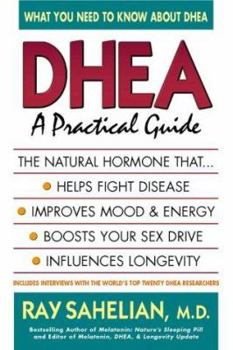Dhea: A Practical Guide
Select Format
Select Condition 
Book Overview
A hormone called DHEA (dehydroepiandrosterone), which is produced by the adrenal glands, is now available without a prescription. Researchers claim that DHEA is a means to boosting sex drive,... This description may be from another edition of this product.
Format:Mass Market Paperback
Language:English
ISBN:0895297744
ISBN13:9780895297747
Release Date:July 1996
Publisher:Avery Publishing Group
Length:158 Pages
Weight:0.65 lbs.
Dimensions:0.5" x 6.0" x 9.0"
Age Range:18 years and up
Grade Range:Grade 12 and higher
Customer Reviews
1 rating
Accessible and interesting work on DHEA
Published by Thriftbooks.com User , 19 years ago
DHEA is a natural hormone that declines with age from the late 20s. Since DHEA is a precursor to the estrogens and androgens, this drop in DHEA production has an effect on the body. The author mentions various studies done on rodents as regards the impact of DHEA on longevity, which is very positive. But because such studies do not automatically hold true for humans, he concentrates on the results of human studies. Amongst the biological indicators assessed in these studies are an increase in lean body mass, improved psychological and physical well-being, better coping with stress and increased energy levels. Sahelian interviewed top researchers in the field, who although cautious, consider DHEA supplementation to be beneficial. The hormone appears to exert remedial effects in increasing muscle strength, lean body mass and immune function. The author discusses the various ways in which DHEA may fight and prevent cancer. For example, one study showed that the hormone boosted the power of T-cell function and disrupts the oxidizing effect of chemical carcinogens on cells. Other research suggests that it may have a wide range of salutary effects including the reduction of inflammation. Much work needs to be done, but people wishing to take DHEA should do so under the supervision of a physician. It would also be wise to simultaneously take supplements of other anti-oxidants like selenium and various vitamins. At this stage there are no clear guidelines as to dosage but it would appear that DHEA supplementation should be considered by people over the age of 40. Because of unknown long-term effects, the author urges people to take the lowest amount and with frequent intervals. Sahelian's writing is often witty and always clear and accessible to readers with no medical knowledge. I also recommend other books by this author, like Mind Boosters: A Guide To Natural Supplements That Enhance Your Mind, Memory And Mood, Pregnenolone, and Melatonin: Nature's Sleeping Pill.





